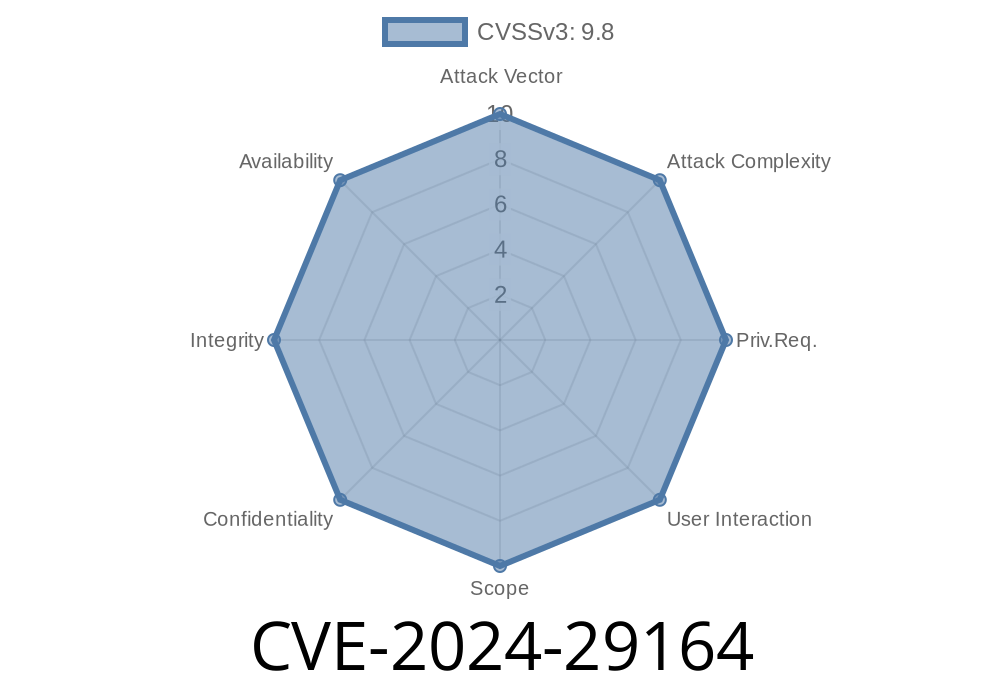In April 2024, a severe vulnerability (CVE-2024-29164) was disclosed in the popular HDF5 data management library (versions through 1.14.3). This flaw enables attackers to trigger a stack buffer overflow in the H5R__decode_heap function, potentially leading to denial of service (DoS) or even arbitrary code execution. HDF5 is widely used in scientific, engineering, and data analysis applications, making this issue highly impactful for organizations relying on this library.
This post gives a clear and practical breakdown of the vulnerability, supporting code snippets, and exploit details. References to the original advisories are included at the end.
What is HDF5?
HDF5 (Hierarchical Data Format version 5) is an open-source file format and set of tools designed to store, organize, and manage large and complex data collections. It’s a foundational library used by projects like TensorFlow, MATLAB, NetCDF, and many research institutions.
Affected Versions: Up to and including 1.14.3
- Impact: Stack buffer overflow leading to instruction pointer corruption, possible denial of service or code execution
Technical Details
At its core, the bug is caused by improper handling of input data in the private H5R__decode_heap function. When processing certain HDF5 object references from heap memory, the function fails to validate or limit the size of the data to be copied into a stack-allocated buffer, leading to a classic stack overflow bug.
Let’s look at a simplified version that highlights the issue. Imagine
// Vulnerable pattern
void H5R__decode_heap(const uint8_t *heap_data, size_t heap_size) {
uint8_t buf[64]; // Fixed-size stack buffer
// Potentially unsafe: no bounds check!
memcpy(buf, heap_data, heap_size);
// ... Further processing on buf ...
}
If heap_size is greater than 64, this overflows buf, corrupting adjacent stack memory. In the actual HDF5 code, the affected function deals with reference decoding, but the flaw is conceptually similar — data from outside isn’t properly checked before being placed on the stack.
Denial of Service (DoS): Crashes the application or service reading a malicious file.
- Arbitrary Code Execution: In some scenarios (e.g., with tailored input and if stack protections are bypassed), an attacker could execute code with the privileges of the process using the HDF5 library.
This overwrites the function’s return address or other critical variables.
4. The attacker can trigger a controlled crash, or with specialized exploitation techniques, hijack execution flow.
Proof of Concept (PoC)
Note: This example gives a basic illustration; actual exploitation depends on the binary and system.
# PoC: Crafting a malicious HDF5 file with an oversized reference heap.
import h5py
with h5py.File("poc_overflow.h5", "w") as f:
# Inserted as placeholder - real exploit may need to modify binary structure
f.create_dataset("data", data=[1,2,3])
# The critical part is manipulating the internal heap, often via custom or fuzzed HDF5 libs.
# In C, reading the file would hit the vulnerable path:
import subprocess
subprocess.run(["your_hdf5_reader", "poc_overflow.h5"])
For a real-world attack, one would generate an HDF5 file with a corrupted heap object targeted at the vulnerable code path.
Mitigation
- Upgrade HDF5: The bug is fixed in later releases. All users should update HDF5 to the latest version.
- File Validation: Avoid parsing untrusted HDF5 files, especially from emails, downloads, or unknown sources.
- Compiler Protections: Use stack cookies/stack canaries (-fstack-protector), AddressSanitizer, modern platforms, and DEP/NX security features.
References
- NVD Entry CVE-2024-29164
- github.com/HDFGroup/hdf5/security/advisories/GHSA-7rmw-8cfc-q4qf
- Upstream Patch Review
- HDF5 Release Notes
Conclusion
CVE-2024-29164 in HDF5’s H5R__decode_heap is a serious vulnerability. If you use HDF5 in your research, apps, or infrastructure, patch immediately and consider reviewing how you process .h5 files. The wide use of HDF5 in science, deep learning, and data engineering amplifies the risk — so act now.
For more details, check out the links above, and feel free to ask for further technical advice on reviewing your code or HDF5’s update steps.
*Authored exclusively for your security needs. Stay safe!*
Timeline
Published on: 05/14/2024 15:15:33 UTC
Last modified on: 07/03/2024 01:52:13 UTC
